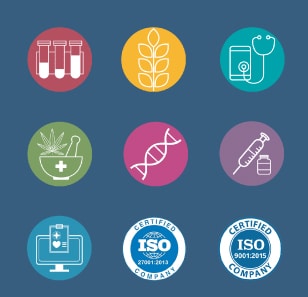Clinical trials are any type of human research that is designed to:
- Detect or validate clinical, pharmacological and / or pharmacodynamic effects of a research product
- Identify any adverse reactions to the research product,
- Study product absorption, distribution, metabolism and excretion
- Determine or ensure the product’s safety and / or effectiveness.
The terms clinical trial and clinical research are synonymous.
History
The world’s first clinical study is attributed to Dr. James Lind (1716-1794). Lind was a doctor of Scottish descent, known as the pioneer of marine hygiene in the Royal Navy. By conducting one of the first clinical trials ever, he developed the theory that citrus fruits cure scurvy. Scurvy is a disease that is now known to be caused by a lack of vitamin C, but in those days “vitamins” was not known at all.
In 1740, out of 1900 men who worked as sailors at sea, 1400 died, most of them infected with Scurvy. According to Lind, Scurvy caused the deaths of more British navy soldiers than French and Spanish weapons. Although Lind was not the first to offer citrus fruit as a remedy for Scurvy, he was the first to systematically examine their effect. This trial, in 1747, is ranked as one of the first clinical trials reported, in the history of medicine, especially a trial in which there are control groups. Lind divided 12 sailors into six groups of two. They all received the same diet, but in addition, each group received a different supplement: one group received two oranges and a lemon. The study of this group was stopped after six days because they simply ran out of fruit, however it was the only group where some impact was seen. His work promoted the practice of preventive medicine and improved the nutrition of the population.
Why Is Human Research Highly Regulated?
Past transgressions led to the need for laws that protect the rights and welfare of human subjects. Below are a number of examples demonstrating the possible dangers of not having regulated processes overseeing medical trials in humans.

S.E. Massengill company (1937)
This company was responsible for the Elixir Sulfenylamide disaster in 1937, which was described as one of the most severe mass poisonings of the 20th century. Elixir sulfanilamide is formed with diethylene glycol as a solvent. The company claimed that it was unaware of the toxicity of diethylene glycol, despite the existence of published studies describing its dangerous properties. The drug was released without safety tests, leading to the deaths of at least one hundred people in fifteen U.S. states. The scandal that ensued led to the approval of the Federal Food, Drug and Cosmetics Act of 1938.
Thalidomide Tragedy (Kefauver-Harris Amendment) (1957)
Thalidomide was first marketed in 1957 in West Germany, where it was available without a prescription. When first released, thalidomide was intended to treat anxiety, sleep problems, “stress” and morning sickness. Although initially the drug was thought to be safe for pregnancy, concerns about birth defects only arose in 1961 when the drug was removed from the European market. The total number of fetuses affected by use during pregnancy is estimated at 10,000, of which about 40% died around birth. Those who survived suffered from limb, eye, urinary and heart problems. Its initial entry into the US market was prevented by Frances Kelsey, an FDA reviewer. Congenital malformations caused by thalidomide have led to the development of regulations and greater monitoring of drugs in many countries.
It was approved for use as a cancer treatment in the United States in 1998.
Willowbrook research – New York (1963)
Between 1963 and 1966 at Willowbrook National School, a study was conducted at an institution for children with mental disabilities in New York. The children were intentionally infected with the hepatitis virus by the researchers. The study was designed to follow the course of viral hepatitis, and to investigate the effectiveness of a hepatitis vaccine.
In an effort to control outbreaks of hepatitis, the medical staff at Willowbrook consulted with Dr. Saul Krugman. Dr. Krugman (the researcher) found that hepatitis developed in 90% of the children hospitalized in Willowbrook shortly after their arrival. Although hepatitis was known to be caused by a virus, it was not known how the hepatitis virus spread, whether it could be prevented, or how many types of viruses caused the disease. Krugman used the children of Willowbrook to answer these questions. One of his studies included feeding the live hepatitis virus from fecal samples to sixty healthy children. Krugman saw their skin and eyes turn yellow and their livers destroyed. He saw them vomiting and refusing to eat. All children who were infected with the hepatitis virus became ill, some severely. Krugman argued that it was justified to “vaccinate” Willowbrook children with the hepatitis virus because most of them, in any case, would get hepatitis anyway. This argument is irrelevant, as by intentionally giving children hepatitis, Krugman had increased that chance to 100%.

Jewish Chronic Disease Hospital –New York (1963)
In 1963, chronic (non-cancerous) patients at the Jewish Chronic Disease Hospital in New York were injected with live human cancer cells. Doctors did not inform the patients of what they were doing in order to not alarm them, as they believed the cancer cells would be rejected.
Contraceptive methods study- San Antonio (1970)
In 1970, a study was conducted with 86 Mexican-American women from low-socioeconomic backgrounds. These women were told they were going to receive birth control pills. Many came from a background of planned parenting, and therefore agreed to be part of the study. What they did not know at the time was the fact that halfway through the experiment, half of the women would receive a placebo pill with no hormones in them at all. This change was conducted without them knowing and without any agreement on their behalf. This led to unexpected pregnancies in 10 of the woman participating in this study.
Tuskegee Syphilis Study –Alabama (1937-1972)
In 1932, the United States Public Health Service (PHS) initiated the Tuskegee’s syphilis study to document the natural history of syphilis. The study subjects were 399 African-American men from poor backgrounds in Macon-Alabama, with latent syphilis; and 201 disease-free men who served as the “control”. The researchers did not reveal the nature of the study to the participants. The subjects were deceived by the investigators when they were told that they were being treated for “bad blood”.
The subjects underwent a thorough medical examination which was to be followed up in six to eight months during which their illness would not be treated. Initially, there was no intention to deprive anyone of long-term care.
Penicillin was approved as a treatment for syphilis in 1943; However, this was deliberately avoided in the study. In addition, subjects were actively prevented from receiving other syphilis treatments. None of the subjects knew that they were involved in the experiment, nor that there was an effective treatment available. Although the original study was expected to be six months long, it lasted for approximately forty (40) years. Of the 400 original subjects, 100 died as a direct result of untreated neurosyphilis at a later stage and no one questioned the ethical issues even though the study was published in several medical journals. In 1972 the public learned about the study through the press, which led to outrage.
All of these and other cases have led to strict legislations for the protection of the individual.
Development Of Regulation In Clinical Trials
Many laws and regulations have been written and as new information becomes understood, new laws are put in place, every single day. Below are a number of important points related to the development of regulations in Clinical Trials:
- In 1964 a guideline for research in human beings was published – the Helsinki Declaration. This declaration states the ethical code for conducting clinical studies in human-beings
- In Israel, the Helsinki Declaration was received as part of the local law, along with public health regulations and the Ministry of Health (MOH) regulations
- In the USA there are the regulations set by the FDA (CFR – Code of Federal Regulations): https://www.fda.gov/science-research/clinical-trials-and-human-subject-protection/regulations-good-clinical-practice-and-clinical-trials
- In Europe, ICH-GCP exists since January 1997. The ICH-GCP was designed to standardize legislations in Europe, Japan and the USA. ICH-GCP is a harmonious standard that protects the rights, safety and well-being of human subjects, minimizes human exposure to research products, improves data quality, accelerates the marketing of new drugs and reduces the cost to sponsors and the public. In April of 2001, Europe adopted a directive that calls for mandatory compliance with ICH-GCP. Https://ichgcp.net/
- In February 2011 the new ISO14155 was released, which relates to the design, execution, registration and reporting of clinical trials conducted in human subjects to evaluate the safety and performance of medical devices. In 2020 the standard was updated to comply with the ever evolving clinical regulatory requirements. https://www.iso.org/standard/71690.html
Failure in research is not only a distant past legacy. Even in an advanced period of delicate legislations and regulations, one can witness cases of research scams and omissions that at their worst, cost us human life.
This is also the case with the famous Paolo Macchiarini, a famous Italian surgeon, born in Switzerland who was previously considered a pioneer in the field of regenerative medicine using synthetic models sown in the stem cells of patients in the trachea. In 2010, Macchiarini was accused of misconduct in research and performing immoral experimental surgeries, even on relatively healthy patients. He was also charged with data falsification, and by 2020, the eight research papers he authored were retracted, with two receiving an expression of concern.
This interesting affair can be heard in the podcast: Dr. Death Season 3. To hear and understand that even in an age of ramified regulation, it is not enough to protect patients, it is vital to ensure proper monitoring and control.
Study Phases
We have looked at a number of tragic examples in the clinical trials world. If we would like to do things right – what and how can we ensure proper and ethical conduct of the research?
The answer to that is to receive expertise and support from dedicated research management companies, also known as “CRO”.
CRO – Clinical Research Organization
- A CRO is a company that provides support for clinical trials and clinical research for the pharmaceutical, biotechnology and medical device industries.
- A CRO provides services such as biopharmaceutical development, biological testing development, commercialization, preclinical research, clinical research, clinical research management, and pharmacovigilance.
- There are a number of large and international CRO companies, as well as small local companies, which are more familiar with local regulations or specialize in a particular niche.
- CROs are experts in the field of research management and can represent the trial developer in order to assist him to comply with the following clinical trial regulations:
- The trial developer is obliged to monitor the clinical research and ensure that it is conducted in accordance with the regulatory laws.
- The developer must employ someone on his behalf, who will visit the research site on several occasions throughout the clinical trial.
- During the visits he must verify and check that the study is being conducted correctly, and the research data, are correct, reliable and appropriate to the original documents.
Stages Of Clinical Research – Pharmaceuticals
-
In the pharmaceutical industry, clinical trials are conducted in a series of steps, called phases:
- Phase I clinical trials typically involve a small group of healthy volunteers to determine the drug safety and identify side effects. Example of number of patients: 20-80.
- Phase II trials are controlled trials in a larger group of volunteer patients (with the disease) to determine drug efficacy and adverse reactions. Example of number of patients: 100-300 patients.
- Phase III trials are larger controlled trials to validate the drug efficacy and monitor adverse reactions during long-term use. In this phase, we also compare the trial drug to common therapies, and gather information that will allow the safe use of the drug or treatment. Example of number of patients: 1000-3000 patients.
- Phase IV trials are post-marketing studies. Their purpose is to monitor the long-term effects and provide additional information on safety and efficacy, including for patient groups in different regimens.
Stages Of Clinical Research – Medical Devices
-
In the medical device industry, clinical trials are conducted as follows:
- Stage I: FIH (FIRST IN HUMAN) = PILOT = SAFETY
- Human research is limited to gathering vital information.
- The purpose of this limited study is to identify possible medical claims for the device, monitor potential research variables for an appropriate outcome variable, examine research procedures, and to determine the accuracy of those potential response variables.
- Phase II + III: = Pivotal / Efficacy:
- In case the sponsor already has answers to the safety of the device from similar products, a multi-center experiment should be conducted to evaluate the performance of the device on a large number of patients and compare it to common devices. This experiment will usually be the basis for regulatory application.
- Step IV – Marketing Tracking:
- Post-approval requirements such as Post-market surveillance (PMS) and Post-market clinical follow-up (PMCF) may be included as a condition of device approval: ongoing evaluation and periodic reporting on the safety, efficacy, and reliability of the device for its intended use.
- In addition, a post-marketing clinical trial is a preferred way to meet the marketing follow-up requirements.
- Stage I: FIH (FIRST IN HUMAN) = PILOT = SAFETY
Types Of Clinical Studies
-
There are several types of clinical research, and in each case, one should check what is the appropriate type of research:
- Open label study: open label research – both parties (doctor and patient) know what treatment is being received
- Single / double blind study: single / double blind study – when one / none of the parties (doctor and patient) does not know what treatment is being received.
- Comparative study: when the experimental treatment is compared to the common treatment
- Placebo-controlled: placebo-controlled – when the treatment tested is compared to placebo treatment
- Prospective study – A study to prove theories based on data collected during the study
- Retrospective study – a study to prove theories based on data collected in the past
- Treatment arms – when the subjects are divided into groups or sub-groups of participants
- Cross-over study – a study in which the treatment arm is replaced during the study and each subject is treated with more than one treatment arm
Below is an example table comparing the clinical research for pharmaceuticals and medical devices:
Step/Topic | Clinical Trials – Pharmaceuticals | Clinical Trials – Medical Devices |
|---|---|---|
Recruitment of healthy people | New preparations are carefully studied during the various stages, starting with a small number of healthy people | In medical devices, especially those that penetrate the body, it is not possible to perform an experiment on healthy people |
Total number of people required in order to show safety and effectiveness | Thousands | Dozens to hundreds |
Use of placebo |
Used as a control in many experiments | Medical equipment cannot be used with medical equipment or this will be considered unethical |
Randomization and blind testing | Can be done easily
| Hard to impossible |
Standard efficiency monitoring tools | ECG, monitoring devices, biochemical indices, etc. | Simulations can be an option for surveillance along with metrics |
Vitality / necessity | It is always necessary; Even the slightest changes in the preparation can lead to unexpected results | Not a necessity of reality and not always required. The need and content will be determined by risk management |
Beyond the characterization of the research, when you seek to conduct clinical research, it is important to select the best professionals, those who will carry out the work thoroughly and professionally and ensure the proper and ethical conduct of the research at all stages.
We at RS-NESS can guarantee a range of services and solutions to carry out any clinical research in a fast, safe and correct manner in accordance with regulatory regulations and adherence to all required ethical rules.
RS-NESS provides a variety of clinical research and pre-clinic services that are tailored to each company according to its needs and development stage. Below are some of the expert services we provide:
- Planning a clinical strategy
- Project management – prioritizing activities, planning budgets, managing schedules
- Planning the clinical trial – initial planning, writing a research summary, finding suitable suppliers and working with them
- Writing the research documents (writing the protocol, the booklet for the researcher, consent form, clinical report, research completion report – (CSR))
- Finding suitable sites and doctors for research (in Israel and abroad)
- Preparation of submission packages, including monitoring and supervision until approval to begin research in Israel (Helsinki Committee, Ministry of Health, AMAR, YAKAR or any other regulatory body).
- Preparation of submission documents in authorities outside Israel (Europe, USA)
- Clinical monitoring, management and contact with research sites (in Israel and abroad)
- Medical monitoring, medical response to all research needs
- CRF design
- In the case of a clinical study that takes place outside Israel – supervision of the study, with control and cooperation of local CRO’s, working with the medical centers
- Data quality control and assurance
- Establishing and writing the company’s clinical procedures
Our goal at RS-NESS is to ensure that research is conducted in a controlled and appropriate manner, according to all laws and regulatory rules. We are experts in leading clinical affairs efforts, enabling our partners to focus on their missions, and above all – we care about ensuring the safety and wellbeing of the patient at all times.



















